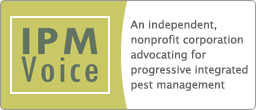Nonprofit and Private IPM Partners
IPM matters to many private and nonprofit organizations. Below are a few that have served on our Advisory Council or actively partnered with the Center in other ways. If you think of other partners that should be listed here, please let us know.
- American Farmland Trust. Conservation organization working with federal, state, and local leaders and communities to develop legislation, implement policies, and execute programs that keep farmers on their land and protect our environment.
- American Phytopathological Society (APS). Professional society dedicated to high-quality, innovative plant pathology research, and driven by scientists from academia, government, industry, and private practice.
- Association of Public and Land-Grant Universities (APLU). Higher education association that provides a forum for the discussion and development of policies and programs affecting higher education and the public interest.
- Audubon International. Nonprofit that provides people with the education and assistance needed to practice responsible management of land, water, wildlife, and natural resources.
- Beyond Pesticides. Advocacy group that works with allies to identify the risks of conventional pest management practices and promote nonchemical and least-hazardous management alternatives.
- Entomological Society of America (ESA). Professional society serving the needs of entomologists and people in related disciplines, with members from educational institutions, health agencies, private industry, and government.
- Informed Green Solutions. Educates the general public on the benefits of environmentally preferable purchasing and the impacts that purchasing decisions have on human health and the environment.
- IPM Institute of North America. Independent, nonprofit organization that accelerates adoption of IPM in agriculture and communities using the power of the marketplace; provides services to ecolabel programs and others including IPM research, standards development, program management and inspector training and certification.
- IPM Voice. Nonprofit corporation that advocates for IPM that is genuinely progressive and seeks continuous improvement of environmental, social and economic conditions through application of accepted scientific principles.
- Knouse Foods. Grower-owned cooperative that is one of the largest suppliers of processed fruit products in the industry, comprising several brands.
- National Center for Healthy Housing (NCHH). Nonprofit corporation dedicated to creating healthy and safe homes for children through practical and proven steps. NCHH brings the public health, housing, environmental, and regulatory communities together to combat disease and injuries caused by hazards in the home.
- Natural Resources Defense Council. Environmental action group with 1.3 million members and a staff of lawyers, scientists, and policy experts working to safeguard people, plants, animals, and natural systems.
- Northeastern Organic Farming Association (NOFA). Nonprofit organization of nearly 5,000 farmers, gardeners, and consumers working to promote healthy food, organic farming practices, and a cleaner environment.
- Red Tomato. A New England-based nonprofit that helps farmers sell their sustainably grown produce to supermarkets, distributors, and other buyers.
- SYSCO. Global food service marketing and distribution firm working with its suppliers to set standards to operate in more sustainable ways.
- Weed Sciences Society of America (WSSA). Nonprofit professional society that promotes research, education, and extension outreach activities related to weeds; provides science-based information to the public and policy makers; and fosters awareness of weeds and their impacts on managed and natural ecosystems.

